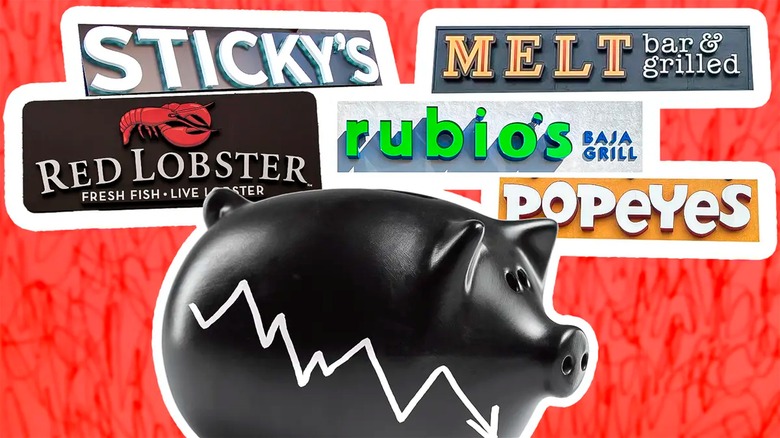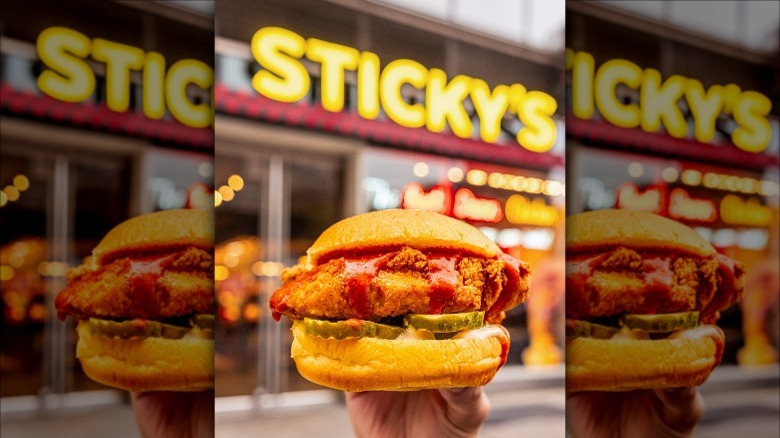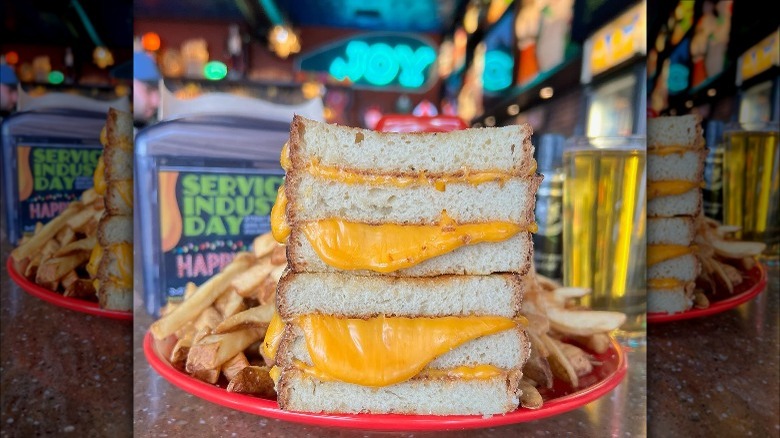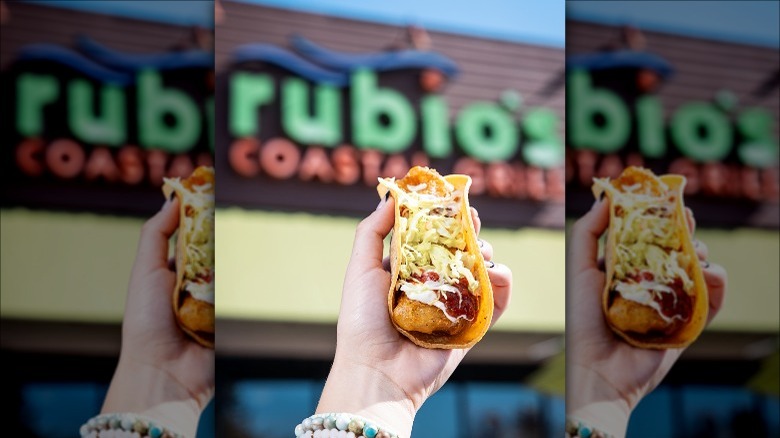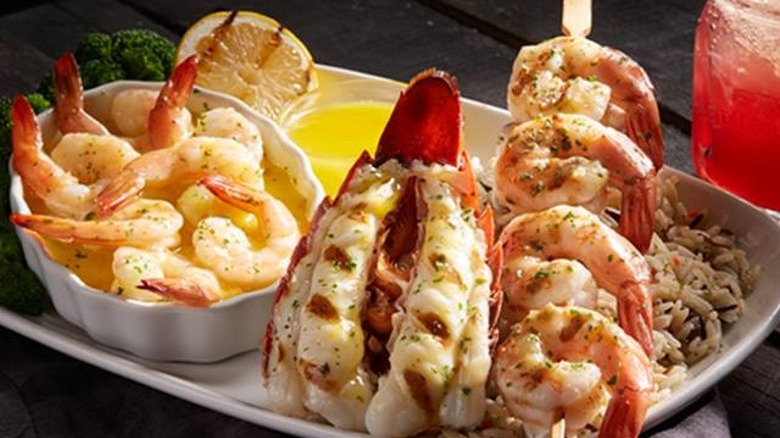These Chain Restaurants All Suffered Bankruptcy Scares In 2024
The restaurant business is a notoriously risky one, as statistics indicate that around 80% may close up shop within five years of opening. Whether they're the smallest mom-and-pop eateries or major chains that once dominated the landscape, restaurants often struggle to stay in business. The reasons range from the dramatic (the major hepatitis outbreak that put the final nail in Chi-Chi's coffin) to the mundane (Howard Johnson's, kind of mid-century casual dining, simply failed to remain relevant in the new millennium.) The pandemic, too, did a number on the restaurant industry as a whole, but even now that masking and social distancing are mercifully behind us for the most part, certain chain restaurants are still haunted by the specter of bankruptcy and it's certainly giving their fans (and investors) a good scare.
Among the restaurants with financial woes, as we approach the midpoint of the current year, are local operations like the New York-slash-New Jersey chicken chain Sticky's Finger Joint and Ohio's Melt Bar & Grilled, but there are bigger names as well, including Rubio's Coastal Grill, Red Lobster, and even Popeye's. While not all of these names are teetering on the brink of extinction, there are changes in store for each one, and these changes might not be welcome if you are either a regular patron or these businesses figure heavily in your investment portfolio. (Not that anything we say should in any way be construed as financial advice! We're strictly food specialists here.)
Sticky's Finger Joint
Sticky's Finger Joint is a chicken finger chain that currently has 10 locations in and around New York City (three of them in New Jersey to serve the bridge-and-tunnelites), but at one time it operated 16. More closures may be in store, though, as the chain declared Chapter 11 in April 2024. As to why it's failing, it's not because of the icky-sounding name. Well, okay, the name did prove problematic at one point, but that was because a barbecue chain with a similar moniker sued over usage rights, costing the company a lot of money to defend. Yet another expensive lawsuit involved the landlord of the office where the company has its headquarters.
Apart from its legal woes, Sticky's depends heavily on walk-in customers and has said that the rise of food delivery services put a dent in this type of traffic. Sure, it could (and does) do business with apps including Grubhub, but this has proven to be less lucrative since such apps keep a fairly hefty chunk of the revenue for themselves. Rising food prices have also eaten into Sticky's profits to the extent that much of the company's cash has been flowing in the wrong direction. At this point, the bankruptcy proceedings are still in the early stages, but some restructuring seems likely if Sticky's is to stay in business.
Melt Bar & Grilled
Remember the early 00s, when gourmet grilled cheese was a thing? Melt Bar & Grilled remembers it fondly, as the trend — plus a timely appearance on "Man v. Food" — took it from a single restaurant opened in 2006 to a chain with locations across the state of Ohio. Over the past few years, however, several Melt locations have closed, with company founder Matt Fish admitting that the chain's growth tailed off after 2017. Needless to say, the post-pandemic economic climate hasn't done Melt any favors, either. Plus, it's possible — although we're just speculating here — that people figured out it's easy enough to upgrade your grilled cheese at home. (This, too, might explain why the similarly-themed Tom + Chee pretty much tanked after "Shark Tank".)
In June of 2024, Melt Bar & Grilled declared itself to be bankrupt. According to the Chapter 11 filings, in 2022 the chain had a net loss of $5 million. Sure, it was making money — $9 million in that year alone — but spending more than it earned on rent, salaries, taxes, etc. What's more, as we all know, cheese sure ain't cheap these days. While Fish swears that he will find a way to keep the chain alive, it's too soon to know just what kind of post-bankruptcy changes will be necessitated.
Rubio's Coastal Grill
Rubio's Coastal Grill claims to be the "home of the original fish taco," which is clearly not true since the first location was inspired by fish tacos that Ralph Rubio ate on a spring break trip to Mexico. Still, it is certainly one of the few fast food chains to specialize in this dish and may have helped to establish fish as a more mainstream alternative to other taco fillings such as ground beef or chicken. From a single taco stand in San Diego that opened in 1983, Rubio's eventually expanded to 204 locations, but like Melt Bar & Grilled, it, too, seems to have reached its high water mark in the late 20-teens. Its sales were fairly stagnant from 2018 onward. By the time the pandemic was more or less over, the chain was down to 170 locations and announced the sad news that it was closing its Colorado and Florida restaurants.
By 2024, Rubio's seems to be in freefall, as it now operates a mere 86 locations in Arizona, California, and Nevada and in June filed for its second bankruptcy since 2020. According to the filing, the company is only worth between $10 and $15 million, but owes somewhere between $100 million and $500 million. While the surviving restaurants will stay open for now, the chain is looking to sell the entire operation, so it remains to be seen whether the new owners will stay in the fish taco business or pivot to something completely different.
Red Lobster
Have you ever wondered about the phrase "generous to a fault?" Sure, if you're on the receiving end of such generosity, such as a chain restaurant offering all-you-can-eat shrimp for a fairly low price, you're hardly likely to find fault. If you're a company trying to turn a profit, however, it's a whole 'nother story. While the ever-popular Endless Shrimp deal may not have bankrupted Red Lobster all by itself, it was certainly a contributing factor and an especially egregious one (from an investor's standpoint) for any who might recall how the chain lost millions in 2003 from a similar promo involving endless snow crab.
Red Lobster is one of the grand old names in chain dining, having been around since 1968. While it currently operates over 500 locations, this is down from more than 600. As of May 2024, a number of its restaurants were labeled as being closed on a temporary basis. However, listings for some, such as the ones in Wauwatosa and LaCrosse, Wisconsin, now seem to have disappeared altogether from the Red Lobster website. Don't hold your breath about these restaurants re-opening any time soon, either, since the company's bankruptcy filing discloses over a billion dollars' worth of debt. It seems as if Red Lobster will most likely be sold, and not for the first time. Without knowing the identity of any prospective buyer, we won't even waste our breath (or typing fingers) hypothesizing about what the future may hold for the chain.
Popeyes
If you're shocked to see Popeyes on this list, we hasten to assure you that the company as a whole is doing okay for itself. More than okay, in fact, as its global expansion seems to be thriving — at this point, around 25% of its over 4,000 locations are international ones including recent additions in Poland and the Czech Republic. If you're a loyal Popeyes customer in one particular corner of Georgia, however (the one in the U.S., not the one on the Black Sea), you might have cause to worry since the owner of a 17-unit Popeyes franchise in that state filed for Chapter 11 bankruptcy protection back in January 2024.
RRG Inc., according to the paperwork attendant upon the case, has debts ranging between $1 million and $10 million, but its assets only add up to about $50,000. The reason for the failure is said to be the fact that three of its units were losing more money than they were making, thus serving as the dominoes that knocked over the more successful ones. While 17 Popeyes locations out of thousands may not be such a big deal if you don't live in Georgia, a different Popeyes franchise group called Premier Cajun Kings filed bankruptcy in 2023 and this affected another 19 restaurants in Georgia, Alabama, and Tennessee.
